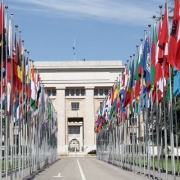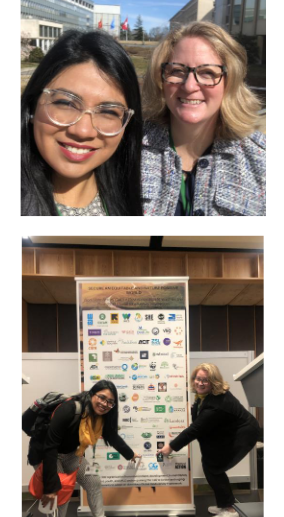Here are excerpts from an article that Cynthia Gonzalez, advocacy coordinator for St. Columban Mission for Justice, Peace and Ecology, wrote for her organization. She composed the piece after attending the UN Convention on Biological Diversity (CBD) in Geneva, Switzerland, on March 14-29, 2022, with her colleague Amy Echeverria. Cynthia, who resides in El Paso, Texas, is a board member of New Mexico El Paso Region Interfaith Power & Light (NMEPR-IPL).
 After two years of a world pandemic, our perceptions of what the world looks like and how it feels might be different. At least that is how it has been for me. For example, walks by the park in my neighborhood are such a treasure to me now. After several months of spending most of my time at home, those walks by the park have become my moments of peace and comfort. The same happens when I see people gathering, smiling, or having conversations. In a way, I feel like it is the first time that I have seen people doing that. I think the pandemic has helped me recognize things that were there before, but I just didn’t notice or appreciate them. Through conversations with friends and relatives, I have found that many feel the same way.
After two years of a world pandemic, our perceptions of what the world looks like and how it feels might be different. At least that is how it has been for me. For example, walks by the park in my neighborhood are such a treasure to me now. After several months of spending most of my time at home, those walks by the park have become my moments of peace and comfort. The same happens when I see people gathering, smiling, or having conversations. In a way, I feel like it is the first time that I have seen people doing that. I think the pandemic has helped me recognize things that were there before, but I just didn’t notice or appreciate them. Through conversations with friends and relatives, I have found that many feel the same way.
A couple of months ago, in March of 2022, I had the opportunity to travel to Geneva, Switzerland, and attend meetings of the United Nations Convention on Biological Diversity (UN CBD). It was the first time I had traveled outside the country since the pandemic started. These UN CBD meetings were so important because the discussions we had were meant to help the global community advance the agenda of COP15.
COP15 is scheduled to take place later this year and the world’s governments will adopt a decade-long strategic plan to conserve and protect the world’s biodiversity. This strategic plan will also help shape action on this issue for decades to come. After a global pandemic, political instability around the world, and the disastrous signs all around us of environmental collapse, the significance of the meetings in Geneva were even more powerful than I anticipated.
I am privileged to have been given an opportunity to see first-hand how interconnected our world is. I am grateful that I got to hear the testimony from developing countries, who are more severely impacted by ecology degradation even though they contributed the least to the problem. Their presence reminded me that what we do in the United States and in other rich nations, ripples across the planet and impacts people far from our homes.
The meetings were long, technical, and intense. Even strong delegations with more than six representatives (the maximum number of delegates allowed at the same time in the venue) found it difficult to keep up with the discussions on many critical agenda items. These larger delegations often had part of their team following the discussions from their hotel room or even from their home countries

Cynthia Gonzalez (L) and Amy Echeverria (R)
Advocates representing Indigenous groups, local communities, youth, women and girls, and civil society organizations, of which the Columbans were a part, were present throughout the meetings. We were all there asking for ambition during the negotiations and shared the same sense of urgency.
The voices of indigenous groups and youth were particularly powerful. Indigenous groups currently protect 80% of the world’s biodiversity. Their voices as the experts at conservation were critical, especially because many conservation actions could impact their ancient traditions and lifestyle. They’re also great teachers at showing us how to take care of Mother/Sister Earth, as they often refer to our planet. They’ve also been some of the groups more severely impacted by the current degradation of our forest, land, and sea. I was inspired by their tenacity and commitment to protect our common home.
As the UN CBD meetings started coming to a close, the delegations decided it was important for them to hold another set of meetings from June 21-26, 2022 in Nairobi, Kenya. The goal of these meetings is to continue to work of developing the strategic plan that will be presented and adopted at COP15. The fact that they had to add another meeting to their calendars gave me a clear sense of how enormous the work ahead is.
And yet, after months and months of isolation, after what felt like a never-ending series of crises from COVID to political unrest to the war in Ukraine, attending these meetings in Geneva (at the epicenter of international action) was an incredible and life changing experience for me.
As Pope Francis reminds us, “All it takes is one good person to restore hope!” (LS #71).


